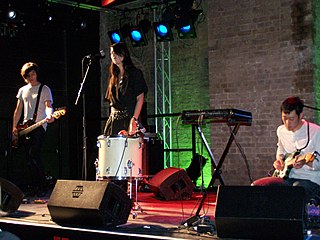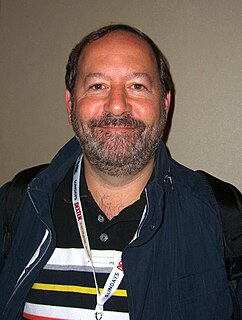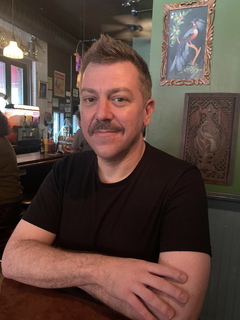No wave was a transient avant-garde music and visual art scene of the late 1970s in downtown New York City. Reacting against punk rock's recycling of rock and roll clichés, no wave musicians instead experimented with noise, dissonance and atonality in addition to non-rock genres like free jazz and disco while often reflecting an abrasive, confrontational, and nihilistic worldview.

Sonic Youth was an American rock band based in New York City, formed in 1981. Founding members Thurston Moore, Kim Gordon and Lee Ranaldo remained together for the entire history of the band, while Steve Shelley (drums) followed a series of short-term drummers in 1985, rounding out the core line-up. Jim O'Rourke was also a member of the band from 1999 to 2005, and Mark Ibold was a member from 2006 to 2011.

The Yeah Yeah Yeahs are an American indie rock band formed in New York City in 2000. The group is composed of vocalist and pianist Karen O, guitarist and keyboardist Nick Zinner, and drummer Brian Chase. They are complemented in live performances by second guitarist David Pajo, who joined as a touring member in 2009 and replaced Imaad Wasif, who had previously held the role. According to an interview that aired during ABC's Live from Central Park SummerStage series, the band's name was taken from modern New York City vernacular.

Kathleen Hanna is an American singer, musician, artist, feminist activist, pioneer of the feminist punk riot grrrl movement, and punk zine writer. In the early-to-mid-1990s she was the lead singer of feminist punk band Bikini Kill, before fronting Le Tigre in the late 1990s and early 2000s. Since 2010, she has recorded as the Julie Ruin.

Lydia Lunch is an American singer, poet, writer, actress and self-empowerment speaker. Her career was spawned by the New York City no wave scene in the 1970s, predominantly as the singer and guitarist of Teenage Jesus and the Jerks.

Nick Zedd was an American filmmaker, author, and painter based in Mexico City. He coined the term Cinema of Transgression in 1985 to describe a loose-knit group of like-minded filmmakers and artists using shock value and black humor in their work. These filmmakers and artistic collaborators included Richard Kern, Tessa Hughes Freeland, Lung Leg, Kembra Pfahler, and Lydia Lunch. Under numerous pen names, Zedd edited and wrote the Underground Film Bulletin (1984–1990) which publicized the work of these filmmakers. The Cinema of Transgression was explored in Jack Sargeant's book Deathtripping.

The Tribeca Festival is an annual film festival organized by Tribeca Productions. It takes place each spring in New York City, showcasing a diverse selection of film, episodic, talks, music, games, art, and immersive programming. Tribeca was founded by Robert De Niro, Jane Rosenthal, and Craig Hatkoff in 2002 to spur the economic and cultural revitalization of lower Manhattan following the 9/11 attacks on the World Trade Center. Until 2021, the festival was known as the Tribeca Film Festival.
No wave cinema was an underground filmmaking movement that flourished on the Lower East Side of New York City from about 1976 to 1985. Sponsored by the artists group Collaborative Projects, no wave cinema was a stripped-down style of guerrilla filmmaking that emphasized dark edgy mood and unrehearsed immediacy above many other artistic concerns – similar to the parallel no wave music movement in its raw and rapid style.
The Cinema of Transgression is a term coined by Nick Zedd in 1985 to describe a New York City-based underground film movement, consisting of a loose-knit group of artists using shock value and black humor in their films. Key players in this movement were Zedd, Kembra Pfahler, Tessa Hughes-Freeland, Casandra Stark, Beth B, Tommy Turner, Jon Moritsugu, Manuel DeLanda, David Wojnarowicz, Richard Kern, and Lydia Lunch, who in the late 1970s and mid-1980s began to make very low-budget films using cheap 8 mm cameras.

Eugene Hütz is a Ukrainian-born singer, composer, disc jockey and actor, most notable as the frontman of the Gypsy punk band Gogol Bordello.
Post-punk revival is a genre of indie rock that emerged in the early 2000s as musicians started to play a stripped down and back-to-basics version of guitar rock emerged into the mainstream. Inspired by the original sounds and aesthetics of garage rock, new wave and post-punk. The music ranged from the atonal tracks, to melodic pop songs and popularised distorted guitar sounds.

Scott Crary is an American film director, producer and writer, best known for having directed, produced, filmed and edited the film Kill Your Idols, a documentary examining three decades of New York art punk bands.
Theoretical Girls were a New York-based no wave band formed by Glenn Branca and Jeff Lohn that existed from 1977 to 1981. Theoretical Girls played only about 20 shows. It released one single, which had some attention in England where it sold a few thousand copies. The band was never signed by a record company, but is well regarded as an early leading no wave group that mixed classical modern ideas of composition with punk rock. This experimental music was mostly supported by the New York art world and minimal art music audience.
Flux Information Sciences were a three-piece noise rock band based in Brooklyn, New York. The band was formed in 1996 by vocalist/guitarist Tristan Bechet and keyboardist Sebastian Brault who met in art school in Marseilles. A revolving drummer policy saw Derek Ethridge replace Phil Hernandez in 1999, who was in turn replaced by Siobhan Duffy. Eventually the band settled on the line-up of Bechet and Brault, with Christopher Pravdica on electronics.
Post-punk is a broad genre of rock music that emerged in the late 1970s as musicians departed from the raw simplicity and traditionalism of punk rock, instead adopting a variety of avant-garde sensibilities and non-rock influences. Inspired by punk's energy and DIY ethic but determined to break from rock cliches, artists experimented with styles like funk, electronic music, jazz, and dance music; the production techniques of dub and disco; and ideas from art and politics, including critical theory, modernist art, cinema and literature. These communities produced independent record labels, visual art, multimedia performances and fanzines.

HTRK is an Australian band formed in 2003.
Riot grrrl is an underground feminist punk movement that began during the early 1990s within the United States in Olympia, Washington and the greater Pacific Northwest and has expanded to at least 26 other countries. Riot grrrl is a subcultural movement that combines feminism, punk music, and politics. It is often associated with third-wave feminism, which is sometimes seen as having grown out of the riot grrrl movement and has recently been seen in fourth-wave feminist punk music that rose in the 2010s. The genre has also been described as coming out of indie rock, with the punk scene serving as an inspiration for a movement in which women could express themselves the same way men have been doing all along. To quote Liz Naylor, who would become the manager of riot grrrl band Huggy Bear:
There was a lot of anger and self-mutilation. In a symbolic sense, women were cutting and destroying the established image of femininity, aggressively tearing it down.

Josh Braun is an American businessperson, film producer, musician and comics publisher known for his work in the bands Circus Mort and The Del-Byzanteens, for his formation in the companies Submarine Entertainment, and New Comic Co., the latter of which is responsible for republishing the horror comics Creepy and Eerie.
Lana Wilson is an American filmmaker. She directed the feature documentaries After Tiller, The Departure, and Miss Americana. The first two films were nominated for the Independent Spirit Award for Best Documentary.

Aaron Hillis is an American writer, film critic, director, film festival programmer, and curator.











